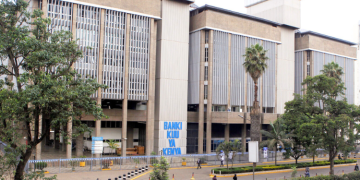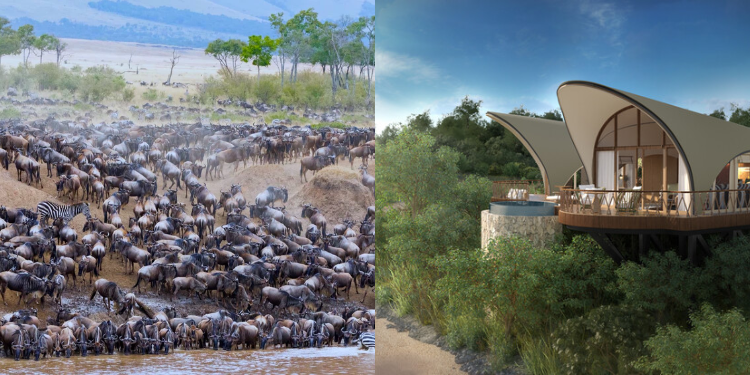The Kenya Wildlife Service (KWS) has addressed reports that the construction of the Ritz-Carlton Safari Camp within the Maasai Mara National Reserve is blocking wildebeest migration routes and wildlife river crossings.
In a statement on November 27, KWS said the images, pictures, and narratives circulating online relate to historical events that were addressed in previous years, around 2018 and 2020.
“Several of the images, pictures, and narratives circulating online relate to historical events that were addressed in previous years, around 2018 and 2020. These materials are outdated, misleading, or presented without proper context, and may also reflect opposing and competing commercial interests surrounding tourism investments in Mara,” read part of the statement.
“Therefore, we encourage the public to rely on verified and official information to ensure that the general public is not misguided.”
Ritz-Carlton Safari Camp Location
Additionally, KWS clarified that the Ritz-Carlton Safari Camp lies within a designated low-use tourism investment zone under the Maasai Mara National Reserve Management Plan 2023–2032.
The zoning was guided by extensive scientific and ecological assessments conducted in collaboration with national and county authorities to ensure alignment with conservation priorities.
The clarification comes after a lawsuit filed by Maasai elder and conservationist Meitamei Olol Dapash, who accused Ritz-Carlton and its parent company, Marriott Lodge, of ignoring local opposition and bypassing environmental regulations to build the camp.
He also argued that the site lies directly in the path of migrating wildebeest, zebra, and other wildlife, potentially disrupting an ecosystem already under pressure from booming tourism.
However, Marriott maintained that it complied with all legal requirements and conducted a proper environmental impact assessment, though some residents claim that their consent was fabricated.
“Preservation of wildlife migration for us is a treasure we cannot afford to lose,” Dapash said.
Also Read: Uproar After Tourists Block Wildebeest Migration
KWS Denies Ritz-Carlton Safari Camp Is Obstructing Wildebeest Migration
Additionally, KWS stated that it has always scientifically verified the integrity of wildebeest migration corridors in the Maasai Mara National Reserve.
The movements of migrating wildebeest have been tracked using more than two decades of GPS collar data collected between 1999 and 2022.
The dataset includes over 60 collared animals, with each GPS fix representing herds ranging from 2,000 to 100,000 wildebeest.
KWS added that long-term monitoring indicated that the entire Maasai Mara functions as a general dispersal area for the species.
Also Read: Kenyan Sues Ritz-Carlton Over Lodge Charging Ksh451,423 Per Night
According to KWS, the data shows that migrating wildebeest utilize the full 68-kilometre width of the Kenya-Tanzania border within the reserve, without following a specific preferred route or corridor.
KWS also stated that along the Sand River alone, there are five permanent and more than two seasonal safari camps, none of which have faced the level of negative publicity currently directed at the Ritz-Carlton Safari Camp.
KWS concluded that the long-term monitoring data demonstrate that the Ritz-Carlton Safari Camp, along with other camps along the Sand River, does not obstruct or interfere with any wildebeest migration corridors.
“Therefore, the long-term monitoring data conclusively indicates that the location of the Ritz-Carlton Safari Camp and the other five safari camps along the Sand River camps do not fall within, obstruct, or interfere with any wildebeest migration corridors,” read part of the statement.
Follow our WhatsApp Channel and X Account for real-time news updates.











































































